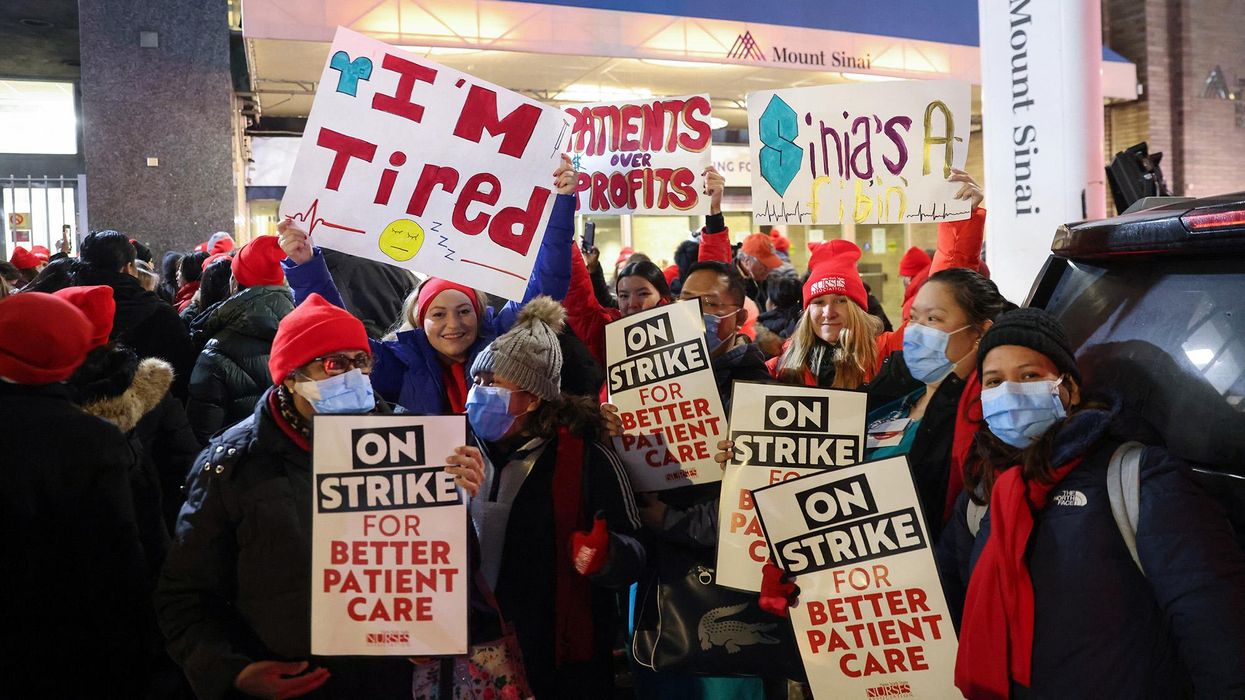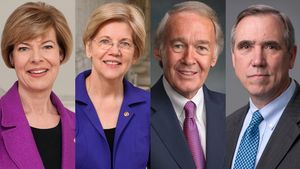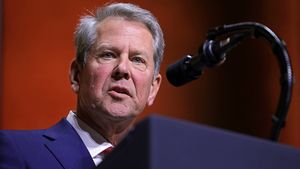(CNN) — More than 7,000 nurses at two major New York City hospitals walked off the job Monday, arguing immense staffing shortages are causing widespread burnout and hindering their ability to properly care for their patients.
The nurses say they are working long hours in unsafe conditions without enough pay — a refrain echoed by several other nurses strikes across the country over the past year. The union representing the nurses said an offer of 19 percent pay hikes isn't enough to solve staffing shortages.
This is the latest in a series of strikes in the health care industry in recent years. Those union members who were on the front lines during the three-year battle with the Covid pandemic say the system is no longer able to function with the widespread shortages that arose during those years.
Although tentative deals had been reached in recent days covering nurses at several hospitals, including two new agreements late Sunday evening, talks with Mount Sinai hospital on the Upper East Side in Manhattan and at three locations of the Montefiore Medical Center in the Bronx failed overnight.
"After bargaining late into the night at Montefiore and Mount Sinai Hospital yesterday, no tentative agreements were reached. Today, more than 7,000 nurses at two hospitals are on strike for fair contracts that improve patient care," the New York State Nurses Association said in a Monday statement.
Hundreds of nurses and supporters were out on the picket line in front of Mount Sinai early Monday, filling two city blocks, with the number of pickets continuing to grow throughout the morning. The picket line spilled out onto the street, sometimes blocking traffic. At Montefiore, picketers chanted "Safe staffing saves lives." Passing drivers at both hospitals were honking their horns in support, bringing cheers from the picket lines.
"We've been fighting for working under safer conditions," Warren Urquhart, a transplant nurse at Mount Sinai, told CNN Monday while on the picket line. "We do the best we can every day. There's something wrong inside the hospital. That's why we're outside the hospital."
Cars are honking as they drive by, prompting the nurses to cheer and wave their signs.
Both hospitals said earlier on Monday morning that efforts to reach an agreement were unsuccessful.
"NYSNA leadership walked out of negotiations shortly after 1 a.m. ET, refusing to accept the exact same 19.1% increased wage offer agreed to by eight other hospitals, including two other Mount Sinai Health System campuses, and disregarding the governor's solution to avoid a strike," Lucia Lee, a spokesperson for Mount Sinai, said in a statement to CNN.
Montefiore said it was "a sad day for New York City."
"Despite Montefiore's offer of a 19.1 percent compounded wage increase — the same offer agreed to at the wealthiest of our peer institutions — and a commitment to create over 170 new nursing positions ... NYSNA's leadership has decided to walk away from the bedsides of their patients," the medical center said in a statement.
Overworked and burned out
Although the union has agreed to the same raises at other hospitals, it said its major complaint at Mount Sinai and Montefiore is that nurses were being overworked and facing burnout after three years of working on the frontlines, battling the pandemic. They say the hours and the stress of having too many patients to care for is driving away nurses and creating a worsening crisis in staffing and patient care.
"We need management to come to the table and provide better staffing," NYSNA President Nancy Hagans said in a press call Sunday afternoon.
The union insists it is striking in an effort to improve patient care.
"Going into the hospital to get the care you need is NOT crossing our strike line. Patients should seek hospital care immediately if they need it," it said in the statement. "We would rather be the ones providing that care, but our bosses have pushed us to be out here instead."
According to Hagans, Montefiore has 760 nursing vacancies, adding that "too often one nurse in the emergency department is responsible for 20 patients instead of the standard of three patients."
Montefiore emergency room nurse Judy Gonzalez spoke Monday of the frustration of not being able to take proper care of her patients because of the staffing shortages. At the Montefiore Moses campus, the number of unfilled positions have more than doubled since before the pandemic, she said.
"I don't feel like I'm doing a service to my patients," she said. "I have patients who grab my shirt, and I can't help them because I have to do something else," said Gonzalez, who has been at Montefiore for 40 years.
Gonzalez is a member of the union's negotiating team. She was on the picket line early Monday after she said she was at negotiations until about 3:30 am.
On Sunday evening, New York Gov. Kathy Hochul had urged the management and the union to agree to binding arbitration as a way of avoiding the strike. Although the management of the two hospitals embraced the idea, the union did not.
"We will not give up on our fight to ensure that our patients have enough nurses at the bedside," the union said in response to Hochul's arbitration suggestion.
But the hospitals attacked the union's decision to reject the arbitration offer and go on strike instead and called on nurses to reject the strike and stay on the job.
"NYSNA continues its reckless behavior. The Governor's proposal would have provided a path to avoid a strike," Mount Sinai said in a statement Monday. "Our first priority is the safety of our patients. We're prepared to minimize disruption, and we encourage Mount Sinai nurses to continue providing the world-class care they're known for, in spite of NYSNA's strike."
Contingency plans
The hospitals have been preparing for a strike since the nurses union gave notice of its plans 10 days ago. The affected hospitals plan on paying temporary "traveling" nurses to fill in where possible and some had already begun transferring patients. A Mount Sinai spokesperson said Monday that it has brought in "hundreds" of traveling nurses and some of the hospitals non-nursing staff has been redeployed. There are 3,600 nurses in the union at Mount Sinai.
Montefiore released a notice to staff, obtained by CNN, telling nurses how to quit the union and stay on the job if they wanted to continue to care for their patients.
Mount Sinai, which operates two hospitals that reached deals Sunday evening in addition to the one still facing a strike, started transferring infants in the neonatal intensive care unit at the end of this past week. Hospitals facing the possibility of strikes had already taken steps to postpone some elective procedures.
The union says the hospitals will be spending more on hiring temporary nurses at a significantly greater cost. It argues the hospitals should agree to their demands to hire more staff and grant the raises the union is seeking.
"As nurses, our top concern is patient safety," Hagans said in a statement Friday. "Yet nurses ... have been forced to work without enough staff, stretched to our breaking point, sometimes with one nurse in the Emergency Department responsible for 20 patients. That's not safe for nurses or our patients."
A contentious negotiation
The hospitals say they are doing what they can to hire more nursing staff.
"Mount Sinai is dismayed by NYSNA's reckless actions," Mount Sinai said in a statement Friday. "The union is jeopardizing patients' care, and it's forcing valued Mount Sinai nurses to choose between their dedication to patient care and their own livelihoods."
Nurses at the first hospital to reach a tentative deal, New York-Presbyterian, ratified that agreement in a result announced by the union on Saturday. It was a close call with 57 percent of nurses voting yes and 43 percent against. The tentative deals reached over the last few days still need to be ratified by rank-and-file union members before they can take effect.
Strikes have become more common nationwide, as tight labor markets and unhappiness with work conditions have prompted unionized employees to flex their muscles more often at the bargaining table.
There were 385 strikes in 2022, up 42 percent from 270 in 2021, according to the Cornell University School of Industrial and Labor Relations. The US Labor Department, which tracks only major strikes by 1,000 or more workers, recorded 20 strikes in the first 11 months of 2022, up 33 percent from the same period in 2021.
Numerous nursing strikes were among the recorded work stoppages, with many unions citing instances of burnout and health problems among members.
Four out of the 20 strikes reported by the Labor Department last year involved nurses unions. The largest was a three-day strike by the 15,000 members of the Minnesota Nurses Association involving 13 hospitals in the state.
— CNN's Tina Burnside, Artemis Moshtaghian and Ramishah Maruf contributed to this report.
The-CNN-Wire
™ & © 2023 Cable News Network, Inc., a Warner Bros. Discovery Company. All rights reserved.
- Miley Cyrus' Plane Makes Emergency Landing After Lightning Strike ›
- One Tree Hill Star Bevin Prince Husband Killed in Lightning Strike ›
- UK to Ban Key Workers From Striking ›
- Britons Urged to Avoid Risky Activity as Paramedics Join Labor Strikes ›
- 100,000 UK Nurses Set to Strike Over Poor Pay and Working Conditions ›
- New York Nurses to Stage Historic Strike ›
- Why NYT Journalists Staged a Historic 24-Hour Strike ›


















































